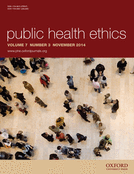-
Views
-
Cite
Cite
Chris Sanders, Discussing the Limits of Confidentiality: The Impact of Criminalizing HIV Nondisclosure on Public Health Nurses’ Counseling Practices, Public Health Ethics, Volume 7, Issue 3, November 2014, Pages 253–260, https://doi.org/10.1093/phe/phu032
Close - Share Icon Share
Abstract
In Canada, there have been a growing number of criminal HIV nondisclosure cases where public health records have been subpoenaed to aid in police investigations and/or to be presented in court as evidence against HIV-positive persons. This has led some to suggest that nurses provide explicit warnings about the limits of confidentiality in relation to crimes related to HIV nondisclosure, while others maintain that a robust account of the limits of confidentiality will undermine the nurse–client relationship and the public health goals of reducing HIV/sexually transmitted infection transmission. This article engages with this issue by exploring whether and how public health nurses endeavor to control information about the limits of confidentiality at the outset of HIV posttest counseling. The data indicate variation in practices, as nurses pragmatically balance ethical and professional concerns; although some nurses intentionally withhold information about the risk of subpoena, others report talking to clients about confidentiality in ways that focus on the risk of harm associated with criminalization. The discussion argues that practice variation also illuminates medico-legal relations between health care and the criminal justice system. Data are drawn from qualitative interviews with 30 nurses working at four public health units in Ontario.



